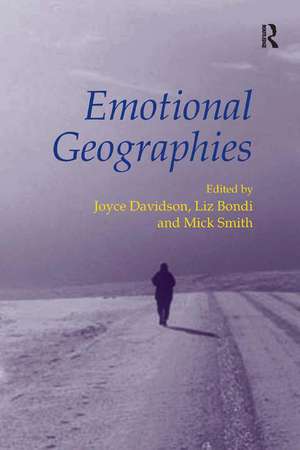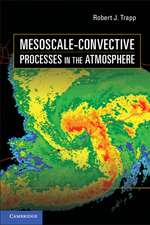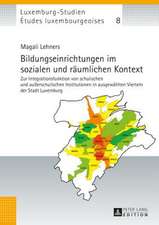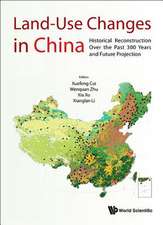Emotional Geographies
Autor Liz Bondi Editat de Joyce Davidsonen Limba Engleză Paperback – 29 mar 2007
| Toate formatele și edițiile | Preț | Express |
|---|---|---|
| Paperback (1) | 418.13 lei 6-8 săpt. | |
| Taylor & Francis – 29 mar 2007 | 418.13 lei 6-8 săpt. | |
| Hardback (1) | 1000.27 lei 6-8 săpt. | |
| Taylor & Francis – 28 aug 2005 | 1000.27 lei 6-8 săpt. |
Preț: 418.13 lei
Nou
Puncte Express: 627
Preț estimativ în valută:
80.02€ • 86.89$ • 67.22£
80.02€ • 86.89$ • 67.22£
Carte tipărită la comandă
Livrare economică 22 aprilie-06 mai
Preluare comenzi: 021 569.72.76
Specificații
ISBN-13: 9780754671077
ISBN-10: 0754671070
Pagini: 272
Ilustrații: Includes 7 b&w illustrations
Dimensiuni: 156 x 234 x 22 mm
Greutate: 0.5 kg
Ediția:New ed
Editura: Taylor & Francis
Colecția Routledge
Locul publicării:Oxford, United Kingdom
ISBN-10: 0754671070
Pagini: 272
Ilustrații: Includes 7 b&w illustrations
Dimensiuni: 156 x 234 x 22 mm
Greutate: 0.5 kg
Ediția:New ed
Editura: Taylor & Francis
Colecția Routledge
Locul publicării:Oxford, United Kingdom
Notă biografică
Joyce Davidson (Department of Geography) and Mick Smith (Departments of Philosophy and Environmental Studies) are based at Queen's University in Canada. Liz Bondi (Schools of GeoSciences and Health in Social Science) is based in Edinburgh University, UK.
Recenzii
’This book is a major contribution to the exploration of emotions. Its concern with the geographies of emotions - their locations, landscapes and relationships - has created a rich and insightful collection of essays that will be invaluable to anyone interested in understanding the emotional, feeling and affect.’ Gillian Rose, Open University, UK ’Undoubtedly, this volume makes an important contribution to a body of work that takes seriously the part played by emotional responses...It deserves a place on the bookshelves of researchers both for its empirical content and the engagement with theory in various chapters. It will also be an invaluable resource for those teaching graduate students and undergraduates about this exciting terrain of the emotional turn.’ Annals of the Association of Geographers ’Students taking courses in each field (social and health geography) will be richer for embracing the landscapes of the human spirit suggested by this book.’ New Zealand Geographer 'The range of emotions encountered in the book is refreshing, and the encouragement to engage with our own and others' emotions in our research is one worth taking to heart.' Matthew Collins, University of Sheffield, UK '...Emotional Geographies elegantly succeeds in demonstrating just how critical participation in an emotionally- and rationally-engaged collaboration might look.' Space and Culture 'The text's editors argue cogently for an "emotional turn" in geography, and provide an interesting and thought provoking work...' European Spatial Research and Policy '... the research [...] is compelling and well-written, and certainly highlights the shifting contours of what we call human geography over the past decade.' International Journal of Heritage Studies '... the volume edited by Davidson et al. offers a powerful example of the prescient contributions made by the affective turn in the interdisciplinary concerns of the field of human geography...Each individu
Cuprins
Chapter 1 Introduction: Geography’s ‘Emotional Turn’, Liz Bondi, Joyce Davidson, Mick Smith; Locating Emotion; Chapter 2 Placing the Dying Body: Emotional, Situational and Embodied Factors in Preferences for Place of Final Care and Death in Cancer, Sara M. Morris, Carol Thomas; Chapter 3 ‘Mourning the Loss’ or ‘No Regrets’: Exploring Women’s Emotional Responses to Hysterectomy, Marion Collis; Chapter 4 ‘Healing and Feeling’: The Place of Emotions in Later Life, Christine Milligan, Amanda Bingley, Gatrell Anthony; Chapter 5 Guilty Pleasures of the Golden Arches: Mapping McDonald’s in Narratives of Round-the-World Travel, Jennie Germann Molz; Chapter 6 The Place of Emotions within Place, John Urry; Relating Emotion; Chapter 7 ‘Not a Display of Emotions’: Emotional Geographies in the Scottish Highlands, Hester Parr, Chris Philo, Nicola Burns; Chapter 8 Freedom, Space and Perspective: Moving Encounters with Other Ecologies, David Conradson; Chapter 9 The Geographies of ‘Going Out’: Emotion and Embodiment in the Evening Economy, Phil Hubbard; Chapter 10 Environments of Memory: Home Space, Later Life and Grief, Jenny Hockey, Bridget Penhale, David Sibley; Chapter 11 The Gendered Psychodynamics of Consumer Culture, Colleen Heenan; Chapter 12 Affecting Touch: Towards a ‘Felt’ Phenomenology of Therapeutic Touch, Mark Paterson; Representing Emotion; Chapter 13 Ageing and the Emotions: Framing Old Age in Victorian Painting, Mike Hepworth; Chapter 14 Intimate Distances: Considering Questions of ‘Us’, Deborah Thien; Chapter 15 An Ecology of Emotion, Memory, Self and Landscape, Owain Jones; Chapter 16 On ‘Being’ Moved by Nature: Geography, Emotion and Environmental Ethics, Mick Smith; Chapter 17 The Place of Emotions in Research: From Part Itioning Emotion and Reason to the Emotional Dynamics of Research Relationships, Liz Bondi;
Descriere
Bringing together well-established interdisciplinary scholars and a new generation of researchers, this volume presents a wide range of innovative studies of fundamentally important questions of emotion. The book demonstrates the richness that an interdisciplinary engagement with the emotionality of socio-spatial life generates.
















